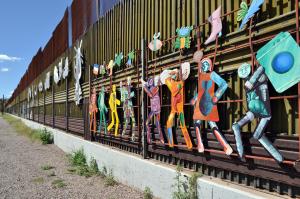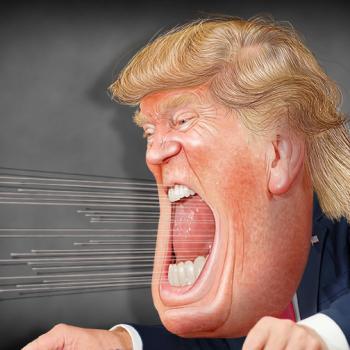
Jonathan McIntosh / flickr
“He who oppresses a poor man insults his Maker, but he who is kind to the needy honors him” (Prov. 14:31 RSV). God’s image is found among the poor; those who would abuse the poor for their own greedy ends not only disregards God, but fights against him, indeed, ridicules him according to their treatment of the poor (cf. Matt. 25:40-46). This is why it is imperative for Christian believers to take a stand for justice, for the poor and abused: what is done to them is being done to the image of God, and therefore, is an affront to God.
When we act, we must act with justice, speaking out in judgment for the defense of those in need: “Open your mouth, judge righteously, maintain the rights of the poor and needy” (Prov. 31:9 RSV). This call is especially for those who wander around, seeking safety in a new land: they have lost everything, making them poor and vulnerable indeed. Not only were they abused before they became migrants, but their lives were put in jeopardy; if they stayed put, they not only would likely suffer an unjust and tortuous demise, their loved ones would receive similar treatment. By moving away, by trying to find a new place to live and thrive, they are doing what any wise person would do in their situation. They should be helped. The injustices they face should be remedied, but until it is, the image and likeness of God in them demands respect. Those who follow after God, those who listen and obey him will welcome anyone in need:
Thus says the LORD: Do justice and righteousness, and deliver from the hand of the oppressor him who has been robbed. And do no wrong or violence to the alien, the fatherless, and the widow, nor shed innocent blood in this place (Jer. 22:3 RSV).
Christians, after all, have an experience of this in their own lives. They were enslaved and abused by sin. God, nonetheless, has welcomed them. It can be said that God came down from heaven so that he could lead the migration of humanity to heaven.[1] What God has shown to us, God expects us to show to others: “He has showed you, O man, what is good; and what does the LORD require of you but to do justice, and to love kindness, and to walk humbly with your God?” (Mic. 6:8 RSV). God’s mercy is one with his justice and love. He welcomed us despite ourselves, seeking to change us so that we will no longer be in need. Therefore, he tells us to follow his example, to offer hospitality to the needy even as we seek to change what made them to be in need. We cannot expect them to go back and face the grave injustice which made them flee their homeland: we must first welcome them, give them shelter, and help change the circumstances so that others do not feel the need to flee their homeland while making it possible for others to return home (while, likewise, welcoming them among us once they have come here, so that if they want to stay, they have the means to do so as well).
The United States, under the presidency of Donald Trump, is constantly going against the dictates of justice and mercy. Every step of the way, it seems as if Trump is intent on making things worse for the downtrodden. His plan to take away aid from El Salvador, Guatemala and the Honduras will not put pressure on the leaders of those nations to make things better; rather, it will make things worse as the United States will have even less say as to what goes on in those countries, making more people want to flee and find a better place to live and thrive. This is not new: U.S. policy in regards Latin America is a major reason for the problems Latin American peoples face today. Trump and his disregard to justice will exponentially make the situation more difficult, not just in Latin America, but in the United States as well. Perhaps this is his purpose, with the intention to make a crisis so that his possible decision to close of the border between Mexico and the United States will be much more readily accepted by a populace which does not understand why the crisis is there in the first place.
The border wall, and indeed, the desire to entirely close the border between Mexico and the United States, while a dream that might inspire white supremacists, can only harm the United States. Economically, it makes no sense. Morally, of course, there is no justification, no just cause; while the poor and oppressed of other nations will find their lives that much worse, it is also true that the people of the United States will find the consequences of such evil will be upon themselves as well. The United States would find its own economy destroyed. And, as Pope Francis indicated, the wall not only keeps others out, but it would lead to our own self-imprisonment. This should not be surprising: the same ideology which is promoting this triumph of the will over the good has already worked against the needs of Americans, from Puerto Rico, where proper aid has not been given to fit the needs of American citizens, to health care, where we see the Trump Administration working to destroy the protections put in place by the ACA. [2]
The cruelty implied behind many of Trump’s policies cannot go unchallenged. Christians, especially, must speak out. It is a part of the mission of the Church, as St. John Paul II stated, to care for and help the poor and needy, not just by works of charity, but by eliminating structures of injustice which make them poor and needy:
All concern for the sick and suffering is part of the Church’s life and mission. The Church has always understood herself to be charged by Christ with the care of the poor, the weak, the defenceless, the suffering and those who mourn. This means that, as you alleviate suffering and seek to heal, you also bear witness to the Christian view of suffering and to the meaning of life and death as taught by your Christian faith.[3]
To be concerned with the migrants, who are poor and helpless, is to take on the mission of the church, for it is by acting upon social justice do we continue the work of Christ in the world. We must, as Pope Francis indicates, accept the challenge before us, to show solidarity and mercy to those scrambling for their lives:
Before the challenges of contemporary movements of migration, the only reasonable response is one of solidarity and mercy. A response less concerned with calculations, than with the need for an equitable distribution of responsibilities, an honest and sincere assessment of the alternatives and a prudent management. A just policy is one at the service of the person, of every person involved; a policy that provides for solutions that can ensure security, respect for the rights and dignity of all; a policy concerned for the good of one’s own country, while taking into account that of others in an ever more interconnected world. It is to this world that the young look.[4]
The world we live in is interconnected, and what we do or do not do for those in need will affect us all. We must promote justice. We must see why people are in need and seek to fix it, especially when our own policies have led to their disgrace. Those who will make the situation worse must be rejected. There can no longer be a general appeal for the common good; Pope Francis, says, we must actually act and change the system:
The condition of hungry and malnourished people shows that a generic appeal for cooperation or for the common good is not enough and we cannot stop at that. Perhaps a different question should be asked: is it still possible to conceive of a society whose resources are in the hands of the few which forces the least privileged to make do with no more than the crumbs?[5]
Pope Francis is right; we can no longer look at the situation where the rich elite give a few crumbs out and call that charity. Charity which disregards justice is not charity. Trump, and those who promote his policies, are promoting the structures of sin which perpetuate injustice in the world. If we want to solve the crisis, we cannot reinforce the policies which made them in the first place. We must do something different. We must work for the common good and truly deconstruct the structures of sin and bring about the solidarity which alone can deal with the problem at hand.
[1] Obviously, this poetic diction must be interpreted properly: neither is God nor heaven is located in a particular physical place.
[2] If Trump wants to replace the ACA, he does not need to repeal it. All he needs to so is establish legislation which can be shown to be better, and it will be voted upon and accepted. Promising something better in the fullness of time, while removing the protections of the ACA, will only lead to more needless deaths. But, Trump, far from pro-life, has no concern about the needy, which is why he threatens to remove needed resources from many poor and hungry Americans, resources which they need in order to survive.
[3] St. John Paul II. “Address to Leaders in Catholic Health Care.” Vatican translation (Sept. 14, 1987).
[4] Pope Francis, “Holy Mass for Migrants.” Vatican translation (July 6, 2018).
[5] Pope Francis, “Message for World Food Day 2015.” Vatican Translation. (Oct. 16, 2015).
Stay in touch! Like A Little Bit of Nothing on Facebook













